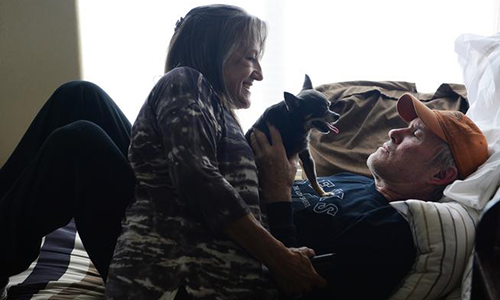RESOURCE CENTER
CTE Treatments
Finding treatment for possible CTE
There have been very few studies on how to treat the clinical symptoms of CTE, and even fewer clinical trials exploring innovative therapies that could slow or stop the progression of the disease. (Learn how you can help advance CTE research by clicking here). Part of the reason for the lack of studies on CTE is because CTE cannot yet be diagnosed with a known level of statistical accuracy in living patients.
The good news is that there are many therapies available to treat the symptoms associated with CTE so that patients can have a better quality of life. If you suspect you have CTE, it is also important to remember that you may not have the disease. Therefore, focusing on treating the symptoms is currently the best approach.
Learn from clinicians who specialize in treating suspected CTE
In 2019, Concussion Legacy Foundation medical director and co-founder Dr. Robert Cantu and Andrew Budson, Associate Director for Research at the Boston University Alzheimer's Disease Center, published the first ever CTE management recommendations in Expert Review of Neurotherapeutics. The review is meant to assist clinicians in diagnosing CTE as unlikely, possible, or probable, and suggests non-pharmacologic and pharmacologic treatments for symptoms of CTE in order to help improve quality of life. You can view or download the publication here to share with your doctor.
Watch the video below to learn more from Dr. Cantu about the publication and how he approaches treating patients with suspected CTE.
Dr. James Castle is a neurologist at NorthShore University Healthsystem who specializes in treating patients with suspected CTE. Dr. Castle joined us for a webinar to share his insights on managing and treating CTE. Watch:
How to find the right doctor
When searching for a specialist to help treat your suspected CTE, look for a clinician who specializes in evaluating and treating brain disorders involving cognitive, mood, and behavioral difficulties. This doctor may be a neurologist (especially a cognitive or behavioral neurologist), a psychologist (especially a neuropsychologist), or a psychiatrist (especially a neuropsychiatrist).
Because CTE is a neurodegenerative disease, a clinician who specializes predominantly in concussions or traumatic brain injury may not be appropriate. Rather, a clinician who understands disorders such as Alzheimer's disease, frontotemporal dementia, and related conditions may be more appropriate.
To learn about which type of doctor to see for possible CTE, and what to discuss with your doctor, watch this video featuring Dr. Robert Stern, director of clinical research at the Boston University CTE Center:
If you are suffering from suspected CTE and are struggling to find the right doctor, please reach out to the CLF HelpLine.
You May Also Like

Those struggling with suspected CTE are not the only ones who need support. View tools and resources for CTE caregivers.
Caregiving for CTE
Staying active, eating well, and maintaining healthy sleep habits can make a world of difference when managing CTE symptoms. Take it from Mike Adamle.
The Mike Adamle Project: Rise Above